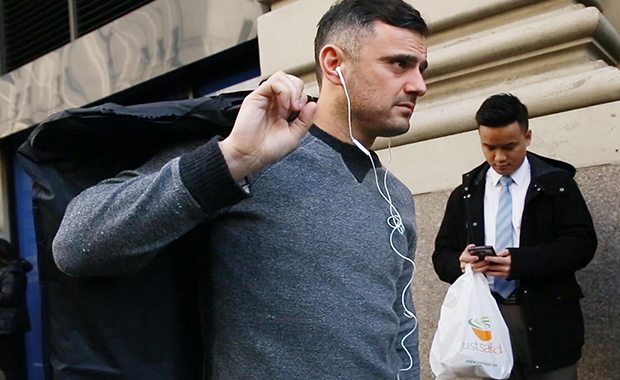Life
The Gary Vaynerchuk Guide to Crushing It at Life

I found out about Gary Vaynerchuk about six months ago. His videos would constantly appear on my LinkedIn feed. I didn’t know anything about him. One day, I finally caved by clicking on a video and my life has changed since then.
My jaw dropped after watching one of his videos. I could feel the hair raise on my arms. I felt like he was directly speaking to me. This man is unfiltered, unapologetic, unadulterated. I was hooked by his upfront and honest perspective. I love taking in his content and suggest it for everyone for he will give you a harsh but necessary dose of reality.
Vaynerchuk is very candid—some will even call him overly-aggressive. But he wishes the best for everyone. He wants people to be successful and happy. Through my learnings from his content, I’ve noticed four themes in his life that I’d like to share with you. These themes are what drives him in business and life. My aim is that you take in these themes, and use them to help you crush it in business and life.
Here are the four important lessons I’ve learned from Gary Vaynerchuk:
1. Regret
When you’re old and immobile, you might look back at the things you did, but you’ll also look back in pain on the things you never did. The pain of not taking action stings more than taking action. We have one shot at this game and every day is a chance to fulfill our destiny. Don’t wait for tomorrow. There will never be the right time to get started.
2. Gratitude
I don’t know what your situation is in life. If you are an Addicted2Success reader then I’ll assume you are looking to improve your situation. As I am writing this, I am becoming grateful to the fact that I have food in my stomach, a roof over my head, a loving family, and a clean bill of health. As minute as these sound, I’m grateful every single day for these things.
It’s usually the small things in life that make me grateful for being alive—a delicious meal, a safe living situation, or spending time with my family. People literally kill for these things. As the adage goes, you don’t know how good you have it until it’s gone. Don’t take it for granted.
https://www.youtube.com/watch?v=ElAz2Akoy-U
3. Self-Awareness
What I really like about Gary Vaynerchuk is that he truly knows himself. He understands his strengths and weaknesses. Gary knows and openly states that he isn’t smart. He was a C student at best as a child. Studying and taking tests were weaknesses of his. He was a killer salesman though. Knowing this, he focused on selling.
He was ripping flowers out of the ground and selling them to homeowners. He was making thousands of dollars a weekend selling baseball cards. He doesn’t know how to build technology, but he leverages the power of it. He’ll outsource the creation of technology, and then use it to help him do what he’s remarkable at—creating inspiring and actionable content.
Double down on your strengths and outsource your weaknesses. It is absolutely vital to know yourself. It’s easy to lie to yourself and continue doing things you’re not good at. It might be why you have a job you don’t like, or continue to get passed up on a promotion. Are you doing things in life that tailor to your strengths?
4. Hustle
This is it. This is what it all comes down to in the end. If you want to become an artist, entrepreneur, or Olympian, you have to put in the work. If you’re going home after work and watching House of Cards, you’re not hustling. If you’re going out and getting wasted on the weekends then you’re not hustling.
Becoming successful requires you to work as hard as possible to achieve it. This is going to require sacrifice. It might mean sacrificing sleep, or time with friends and family. Gary says, “While you’re sleeping, I’m grinding.” His hustle mentality is what took his dad’s wine business from $3 million a year to $60 million a year. It’s what created his $40 million a year digital agency. Oh ya, he’s also a Wall Street Journal bestselling author.
As you can see, there’s nothing here that is extremely profound. They are simple concepts, but damn hard to execute on. It takes a lot of introspection and even more blood, sweat and tears. Remember these 4 things.
- Regret: Will you have the guts to take a risk—knowing when you’re old, you gave it your all?
- Gratitude: Whether you achieve your desired level of success or not, will you be grateful for the positive things in your life?
- Self-Awareness: Can you look deep inside and find out who you truly are?
- Hustle: Are you willing to put in the work?
When Gary speaks, it’s as if he is addressing every unique individual. It’s why people listen, and it’s one of the many qualities that makes him special. He came from a modest childhood. Vaynerchuk is an immigrant from the former Soviet Union. He came with his family with no money, and lived in a studio apartment the size of this office with multiple family members. Using his skills, mindset, and passion, Vaynerchuk created his own success. Now he’s rooting for you to succeed.
What is your favorite thing about Gary Vaynerchuk? Leave your thoughts below!
Life
Why Moving to a New City Can Change Your Mindset
Discover how moving to a new city boosts neuroplasticity, builds resilience, and reshapes your mindset

Relocation is always a challenge. Rebuilding and restarting your life requires you to step outside of your comfort zone. (more…)
Change Your Mindset
The Hidden Reason You Can’t Stay Consistent
If motivation keeps failing you, the real issue isn’t discipline. It’s the identity shaping your habits and long-term success.

Success often looks like a time-management problem. You buy a planner, set reminders, and hope that next week will be different. For a few days, it works. Then stress hits, motivation drops, and old patterns return. (more…)
Did You Know
How Skilled Migrants Are Building Successful Careers After Moving Countries
Behind every successful skilled migrant career is a mix of resilience, strategy, and navigating systems built for locals.

Moving to a new country for work is exciting, but it can also be unnerving. Skilled migrants leave behind familiar systems, networks, and support to pursue better job opportunities and a better future for their families. (more…)
-

 Business4 weeks ago
Business4 weeks agoHow Smart Brands Use Instagram Data to Outperform Competitors
-

 Business4 weeks ago
Business4 weeks agoThe Paradox of Modern Work: Can Tech Make Us More Human?
-

 Change Your Mindset3 weeks ago
Change Your Mindset3 weeks agoThe Hidden Reason You Can’t Stay Consistent
-

 Change Your Mindset3 weeks ago
Change Your Mindset3 weeks agoThe Real Psychology Behind Quitting Too Soon
-

 Entrepreneurs2 weeks ago
Entrepreneurs2 weeks agoThe Six Pillars That Ground Purpose-Driven Leadership (The Berenyi Life Blueprint)
-

 Business3 weeks ago
Business3 weeks agoDIY vs Delegate: The Real Reason You’re Burned Out
-

 Business3 weeks ago
Business3 weeks agoHow AI Agents Can Quietly Expose Your Business to Serious Risk
-

 Life2 weeks ago
Life2 weeks agoWhy Moving to a New City Can Change Your Mindset





























